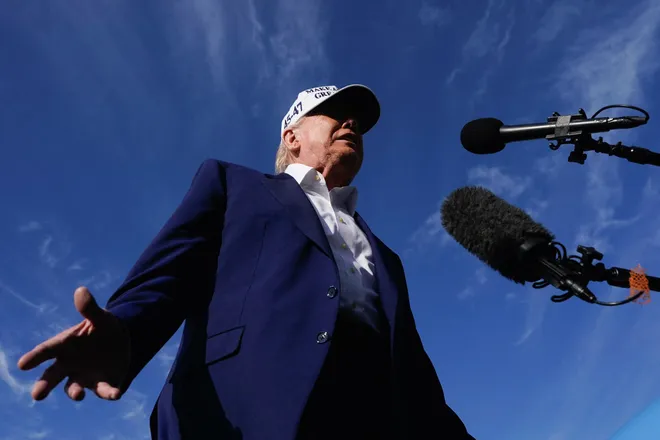President Donald Trump has stated that his administration’s tariff policies are strategically designed to bolster American manufacturing in advanced technology sectors and military equipment production, rather than focusing on apparel and footwear. His comments come amidst ongoing global trade tensions and disruptions to supply chains and financial markets stemming from these policies.
“I’m not looking to make T-shirts, to be honest. I’m not looking to make socks. We can do that very well in other locations,” President Trump told reporters in New Jersey on May 25 before departing on Air Force One. “We are looking to do chips and computers and lots of other things, and tanks and ships.”
President Trump further indicated his alignment with Treasury Secretary Scott Bessent’s view that the U.S. does not require a “booming textile industry.” These remarks have drawn criticism from domestic manufacturers and producers across the fiber, yarn, and home goods sectors. “We’re not looking to make sneakers and T-shirts. We want to make military equipment,” he asserted. “We want to make big things. We want to make, do the AI thing.”
For over a decade, China has held the position as the world’s leading apparel manufacturer and exporter. In response to President Trump’s trade war with Beijing, some Chinese social media users have reacted with AI-generated videos satirizing American workers as unskilled and unmotivated in basic textile manufacturing and smartphone assembly, ending with the slogan “Make America Great Again.”
The American Apparel & Footwear Association (AAFA) has voiced its opposition to President Trump’s statements, arguing that additional tariffs would only exacerbate the challenges faced by the industry. “With 97% of the clothes and shoes we wear being imported, and with clothes and shoes already the most highly tariffed industry in the U.S., we need to focus on common sense solutions that can move the needle,” said AAFA President Steve Lamar in a statement. “More tariffs will only mean higher input costs for U.S. manufacturers and higher prices that will hurt lower income consumers.”
On April 3, President Trump announced global “Liberation Day” reciprocal tariffs, causing a downturn in global financial markets before a 90-day pause was implemented for most countries, excluding China. A key element of President Trump’s victories in the 2016 and 2024 U.S. presidential elections involved appealing to working-class voters who had been affected by the long-term decline of U.S. manufacturing jobs.
The Trump administration has been engaged in trade deal negotiations with various countries since April. The only agreement reached thus far has been with the United Kingdom. Discussions with China, which has implemented retaliatory tariffs on the U.S., are ongoing following an agreement by both nations to reduce substantial tariffs.





Discussion about this post